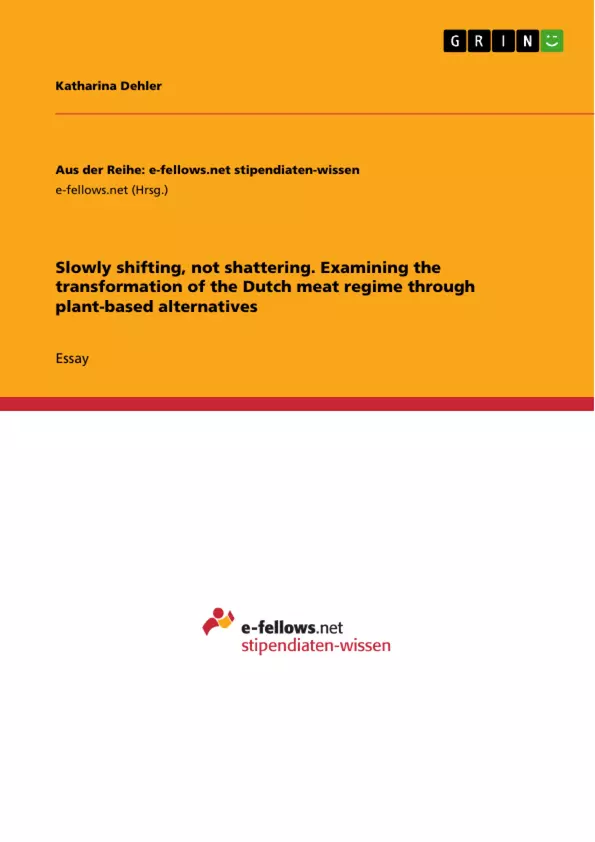This essay examines the transition of the Dutch meat regime towards plant-based meat alternatives (PBMAs). By applying the Multi-level Perspective (MLP) framework, it analyses the role of niche innovations, regime shifts, and landscape pressures in driving change. While the protein transition in the Netherlands has led to some regime reorientation such as increasing consumer acceptance and business diversification, it remains a gradual process. Barriers including cultural norms and economic constraints continue to impede full disruption. The essay concludes with recommending a policy mix to support PBMAs while further destabilising the conventional meat industry.
Table of Contents
- Abstract
- Introduction of the transformation
- Conceptual approach
- Analysis and discussion
- Transition pathway
- Role of businesses
- Role of public policy
- Conclusion and recommendations
Objectives and Key Themes
This essay aims to analyze the transition of the Dutch meat regime towards plant-based meat alternatives (PBMAs) using the Multi-level Perspective (MLP) framework. It explores the interplay between niche innovations, regime shifts, and landscape pressures in driving this change, assessing the extent of transformation and identifying barriers to wider adoption.
- The role of niche innovations in the development and diffusion of PBMAs.
- The impact of landscape pressures (environmental concerns, health issues, ethical considerations) on the meat regime.
- The analysis of regime stability and the factors hindering or facilitating a shift towards PBMAs.
- The role of businesses in the transition, including both established meat companies and emerging PBMA producers.
- The influence of public policy in shaping the adoption and market penetration of PBMAs.
Chapter Summaries
Introduction of the transformation: This chapter introduces the context of the study by highlighting the growing criticism of conventional meat production due to its environmental impact, health concerns, and ethical implications. It then introduces plant-based meat alternatives (PBMAs) as a sustainable innovation aiming to disrupt established meat markets. The chapter emphasizes the significance of the protein transition and focuses on PBMAs as the most developed and popular meat alternative, setting the stage for the analysis of its diffusion in the Netherlands since the introduction of the first commercial PBMAs in 1990.
Conceptual approach: This chapter outlines the theoretical framework used in the essay: the Multi-Level Perspective (MLP). The MLP is described as a model explaining socio-technical transitions through the interaction of three analytical levels: niche-innovations, socio-technical regime, and socio-technical landscape. The chapter details the characteristics of each level, explaining how transitions occur through stepwise interactions between them. It emphasizes the role of Strategic Niche Management, landscape pressures, path dependency, and lock-in effects in shaping the trajectory of transitions, providing the theoretical lens for understanding the transition towards PBMAs in the Netherlands.
Keywords
Plant-based meat alternatives, Multi-level perspective, socio-technical transitions, protein transition, niche innovation, regime shift, landscape pressures, sustainable innovation, Dutch meat regime, policy, business, consumers.
Frequently asked questions
What is the purpose of the document?
The document provides a comprehensive language preview of an academic work analyzing the transition of the Dutch meat regime towards plant-based meat alternatives (PBMAs) using the Multi-level Perspective (MLP) framework.
What topics are covered in the table of contents?
The table of contents lists the following sections: Abstract, Introduction of the transformation, Conceptual approach, Analysis and discussion (including Transition pathway, Role of businesses, and Role of public policy subsections), and Conclusion and recommendations.
What are the main objectives and key themes of the essay?
The essay aims to analyze the transition towards PBMAs, exploring the interplay between niche innovations, regime shifts, and landscape pressures. Key themes include the role of niche innovations, the impact of landscape pressures (environmental concerns, health issues, ethical considerations), analysis of regime stability, the role of businesses, and the influence of public policy.
What is the 'Introduction of the transformation' chapter about?
This chapter introduces the context of the study by highlighting the criticism of conventional meat production and introducing PBMAs as a sustainable innovation. It emphasizes the significance of the protein transition and focuses on PBMAs' diffusion in the Netherlands since 1990.
What is the 'Conceptual approach' chapter about?
This chapter outlines the Multi-Level Perspective (MLP) framework, describing it as a model explaining socio-technical transitions through the interaction of niche-innovations, the socio-technical regime, and the socio-technical landscape. It details each level's characteristics and emphasizes the roles of Strategic Niche Management, landscape pressures, path dependency, and lock-in effects.
What are the keywords associated with this analysis?
The keywords include Plant-based meat alternatives, Multi-level perspective, socio-technical transitions, protein transition, niche innovation, regime shift, landscape pressures, sustainable innovation, Dutch meat regime, policy, business, and consumers.
What does the analysis examine regarding businesses?
The analysis examines the role of businesses in the transition, including both established meat companies and emerging PBMA producers.
How does public policy relate to the PBMAs transition?
The analysis explores the influence of public policy in shaping the adoption and market penetration of PBMAs.
What is the Multi-Level Perspective (MLP)?
The MLP is a theoretical framework used to explain socio-technical transitions. It analyzes the interaction between niche-innovations, the socio-technical regime, and the socio-technical landscape to understand how transitions occur.
- Arbeit zitieren
- Katharina Dehler (Autor:in), 2024, Slowly shifting, not shattering. Examining the transformation of the Dutch meat regime through plant-based alternatives, München, GRIN Verlag, https://www.hausarbeiten.de/document/1574241


